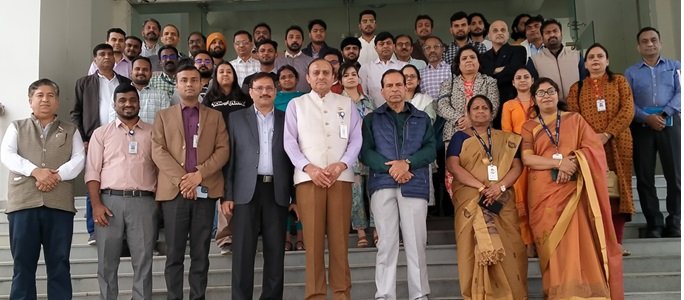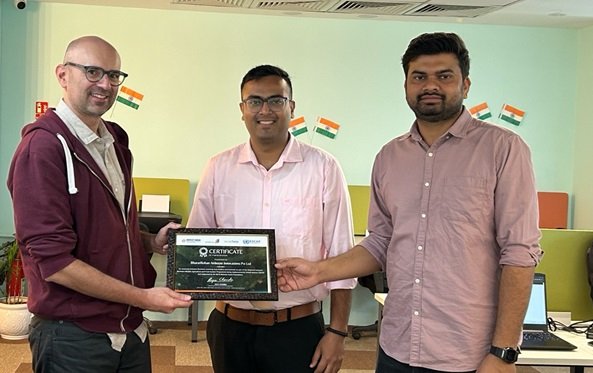FarMart takes the green route towards the future of food
Achieving a staggering year-over-year growth rate of 150 per cent, FarMart is setting new benchmarks for efficiency and growth in the agri-tech sector.
FarMart, one of the leaders in sustainable and futuristic food supply network, has released its Impact Report – “Tracing Impact at FarMart” and continues to seize the spotlight for its extraordinary impact on agriculture. From green logistics to AI-powered food testing, FarMart boasts of unparalleled performance and is also recognized as India’s fastest-growing tech company in 2022 by Deloitte.
Looking Ahead: A Sustainable Future for Food
FarMart, now recognized for its ground-breaking achievements, remains steadfast in its mission to create a sustainable and tech-driven future for agriculture. The company’s focus on innovation, community empowerment and environmental sustainability positions it to continue breaking new ground in the agri-tech sector.
Adding to its environmental commitment, every ton of food sold through FarMart emits 33 per cent fewer emissions than the conventional food supply chain. Collaborating with 2,000 food businesses and establishing partnerships with suppliers in 7,000 pin codes, FarMart has, within five years, avoided 41,974 Metric Tons of CO2 emissions and prevented 28,350 Metric Tons of food waste until March 2023. FarMart is not only revolutionizing agriculture but also paving the way for a more sustainable and environmentally conscious food ecosystem.
“At FarMart, our climate commitments are not separate from our core business. Sustainability is deeply integrated into our model, and we reduce carbon emissions with every transaction. In the next 5 years, FarMart aspires to be an industry leader in driving supply chain decarbonisation efforts for food businesses across the globe,” says Tannya Garg, Impact and ESG Head at FarMart.
Transforming Lives Through Unprecedented Growth
Impacting the lives of over 30 lakh farmers (150 per cent increase from FY22) and counting, FarMart is not merely a platform—it’s a catalyst for change. In the dynamic realm of agriculture, where every decision holds immense consequence, FarMart ensures that farmers receive real-time market rates on a daily basis, empowering them with invaluable insights. From 2021 to 2023, a staggering Rs 1,085 crore value transfer to farmers at fair market rates underscores FarMart’s commitment to fostering economic growth at the grassroots level. FarMart is not just enhancing productivity but elevating the entire agricultural ecosystem. Furthermore, through efficient logistical arrangements and a strategic reduction in transport costs, FarMart has saved 20 per cent of farmers’ income, marking a significant stride towards sustainable and profitable farming. This, coupled with 17 lakh retailer-farmer SMS inputs, solidifies FarMart’s position as the driving force behind positive and measurable change in Indian agriculture.
Deloitte has acknowledged FarMart’s exceptional growth, naming it the fastest-growing tech company in India. Achieving a staggering year-over-year growth rate of 150 per cent, FarMart is setting new benchmarks for efficiency and growth in the agri-tech sector.
Impact Report Unveiled
FarMart is proud to unveil its Impact Report, spotlighting the tangible and positive changes ushered in by its platform.
- Over 30 Lakh Farmers Empowered: Daily access to real-time market rates, along with the many tech-enabled services are empowering an ever-growing number of farmers, enabling informed decision-making and profit maximization.
- Rs 1,085 Crore Value Transfer: From 2021 to 2023, FarMart facilitated a fair market value transfer of Rs 1,085 crore to farmers, ensuring just compensation for their produce.
- 20 per cent of Farmers’ Income Saved: Efficient logistical arrangements and reduced transport costs led to a 20 per cent saving in farmers’ income, contributing to their financial well-being.
- 17 Lakh Retailer-Farmer SMS Inputs: FarMart’s platform facilitated 17 lakh retailer-farmer SMS inputs, fostering communication and collaboration in the agricultural ecosystem.
- Economic Impact:
- Value transferred to farmers at fair market price increased from Rs 1,900,600,000 (FY 2022) to Rs 8,951,300,000 (FY 2023)
- Number of village-level entrepreneurs (VLEs) empowered increased from 30000000 (FY 2022) to 138400000 (FY 2023), posting a 361 per cent increase.
- Earnings by logistics partners increased from ₹3,993,289,000 (FY 2022) to Rs 10,847,574,000 (FY 2023).
Achieving a staggering year-over-year growth rate of














